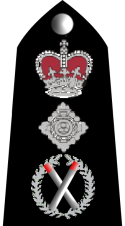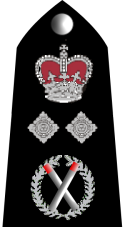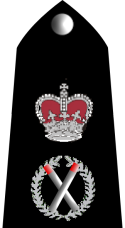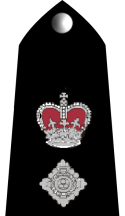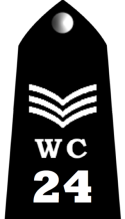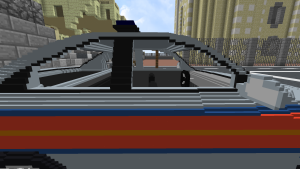Royal Wilden Constabulary
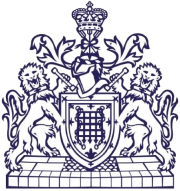 The Arms of the Royal Wilden Constabulary | |
| Agency overview | |
|---|---|
| Formed | 2018 |
| Preceding agencies |
|
| Headquarters | Wexford Yard, Earl's Court 000, 000 |
| Motto | Working Together for a Safer Wilden |
| Minister responsible |
|
| Agency executive |
|
| Parent department | Home Office |
| Website | https://sites.google.com/view/royal-wilden-constabulary |
The Royal Wilden Constabulary (RWC) is the territorial police force responsible for law enforcement and the prevention of crime in Wilden. In addition, it is responsible for some specialised matters throughout Wilden, including national counter-terrorism measures and the protection of specific people, such as the monarch and other members of the royal family, members of the government, and other officials.
The main geographical area of responsibilities consists of the 2 counties, each with 3 boroughs. As the force responsible for the capital of the Wilden, the RWC has significant unique responsibilities and challenges, such as protecting foreign embassies and High Commissions, policing Airports, protecting the exterior of Buckingham Palace, and Downing Street.
The force is led by the Commissioner, whose formal title is the Commissioner of Police. The Commissioner is answerable to the Home Office. The post of Commissioner was first held jointly by <tba>. Sir Anthony Stamp is the current Commissioner; he succeeded Acting Commissioner Sir <tba> in March 2020.
A number of informal names are used for the service, most commonly the RWC. It is also referred to as Scotland Yard or the Yard, after the location of its headquarters in a road called Great Wexford Yard in Earl's Court.
History
The Royal Wilden Constabulary was founded as the Wilden Federal Police in July of 2018 by Attorney General Zachary Lander, with the first constables commencing duty on the 6th of August in the same year. By the 1st of October 2023, the body of Constables was renamed to become with Metropolitan Police Service. With the appointment of Sir Anthony Stamp as Commissioner of Police on the 22nd of March 2020, the service became the Royal Wilden Constabulary.
Governance
Since 2020, The Commissioner of Police has been responsible to the Home Secretary and the Home Office, serving at His Majesty's pleasure. The executive team collaborate on major policy and procedure amendments and reform, this team being made up of the Commissioner, Deputy Commissioner and the various Assistant Commissioners.
Organisation and Structure
The force is headed by a Commissioner and Deputy Commissioner.
Day-to-day operations are overseen by the 3 Assistant Commissioners who each oversee one of the three major areas; Territorial Operations, Specialist Operations and Professionalism. Within the three major areas are various units/divisions that are overseen by either a Chief Superintendent or a Commander; depending on the work that they do.
Within the Local Policing team, stations are often overseen by a Chief Superintendent. Both the uniform branch and CID branch will be seen by a member at the rank of inspector, who is supported by approximately 3 sergeants who are responsible for upwards of 10 police constables (PCs).
Ranks
Insignia
The Royal Wilden Constabulary utilises standard para-military rank insignia for it's full time officers. There are 4 senior officer grades, 4 junior office grades and 2 other rank grades. All officers possess a unique ID number and members at the rank of Constable and Sergeant display their collar numbers on their shoulders, this consists of their unit code and either three or two digits respectively.
Arms
Resources
Police Numbers
Fleet
Budget
Units
Territorial Operations (TO)
Territorial Operations is headed by Assistant Commissioner with the rest of the command made up of the Local Policing and the Special Constabulary each headed up by a commander. Local Policing encompasses the RWC's police stations and the public order unit, the Territorial Support Group, all headed up by a Superintendent reporting into the Commander of Local Policing.
TO 1 - Local Policing
Local policing undertakes the task of day-to-day operations responding to offences as they happen as well as investigating them after they're committed. Officer assigned to police stations throughout the realm respond to crimes in real time and support the community by undertaking patrols to maintain visible police presence, detecting crime and ensuring justice.
TO 2 - Territorial Support Group (TSG)
The Territorial Support Group (TSG) specialises in public order policing, amongst other specialist areas. TSG units patrol the streets of Wilden in marked police vans or "carriers"; using the call sign prefix "Uniform". Generally each carrier has an advanced (police) driver, seven constables and a sergeant. Territorial Support Groups often comprise three carriers, twenty one constables, and three sergeants reporting to an Inspector. They separately patrol designated areas experiencing serious levels of gang violence or public/civil disorder. When deployed, it is by the RWC Information Room at Wexford Yard, usually at the request of a senior police officer within a division.. TSG officers can be identified as TSG from the distinctive "U" in their shoulder numbers.
TO 3 - Wilden Special Constabulary
The Wilden Special Constabulary, which encompasses all of our police volunteers who, are fully warranted constables within the realm. These men and women support their full time colleagues in all aspects of policing Wilden and keeping the community safe. A special constable is an unpaid volunteer police officer however they are entitled to certain allowances and expensing for expenditure in the line of duty.
Specialist Operations (SO)
SO 1 - Strategic Firearms Unit (SFU)
The SFU are a group of highly-trained police officers are on standby to respond to any armed incident in Wilden .They provide a higher firearms capability to that of their divisional colleagues and patrol the nation in their Armed Response Vehicles (A.R.V.s), responding to incidents in real time, to provide instantaneous support to their colleagues when required. These A.R.V.s are often referred to as 'Trojan Units'.
SO 2 - Special Branch
Special Branch is the RWCs specialist counter-terrorism branch responsible for the management of active terrorist threats as well as the investigation of terrorist incidents.
Special Branch’s overriding priority is to keep the public safe and to disrupt terrorist-related activity in the Wilden and against it's interests overseas by:
- Detecting, investigating, and preventing terrorist threats and networks.
- Working with partner agencies to acquire and use intelligence and evidence about terrorism and extremism.
- Ensuring that Counter Terrorism Command activity is focused, delivering value for money, productivity and an efficient and effective use of our resources.
- Engaging, building and maintaining working relationships with boroughs, local communities, national and international partners to better understand their needs and to use their expertise and experience in jointly combating the terrorist threat.
- Working with communities, partners, institutions, groups and other agencies providing advice and support to tackle the ideologies that drive terrorism and extremism.
- Supporting, working and collaborating within the National Counter Terrorism Network to deliver UK counter-terrorism policing.
Special Branch has a number of other national security functions. It has the national lead for domestic extremism, a role undertaken by the National Domestic Extremism Unit. It also deals with sensitive national security investigations, such as Official Secrets Act enquiries, the investigation of war crimes and crimes against humanity, and politically motivated murders.
Special Branch operates against the threat of terrorism at local, national, and international levels and engages with a range of partners to prevent terrorist related activity, including the Security Service (MI5) and Secret Intelligence Service (MI6).
SO 3 - Specialist Protection Unit (SPU)
Protection is responsible for providing officers to protect the Palace of Westminster, which contains the Houses of Parliament; it protects members of the royal family, and government ministers and provides advice on threat levels. In addition, Protection Branch is responsible for security at Downing Street, which is home to the Prime Minister and Chancellor of the Exchequer. Security is also provided by the unit to all royal palaces and residences.
Protection Branch is also responsible for the protection of diplomatic missions in the UK, consistent with the Wexford Convention on Diplomatic Relations (which requires that a host country protect embassies and consulates, while preserving their inviolability). Protection Branch provides security in both police cars and foot patrols, and uniformed and plainclothes operations
SO 4 - Marine Policing Unit (MPU)
The Thames Division is the waterborne policing unit of RWC,. It is responsible for waterborne policing of the River Thames in Wilden and supporting the rest of the Metropolitan Police and to the City of London Police when dealing with incidents in or around any waterway in London. It also has some coastal waterways policing responsibility in conjunction with the Royal Navy. A specialist underwater and confined-spaces search team carries out searches throughout the nation.
SO 5 - Border Security Unit (BSU)
The Border Security Unit (BSU) is responsible for the policing of all ports of entry within Wilden. They work closely with the Strategic Firearms Unit to provide 24/7 coverage to all airports, harbours, ports and other ports of entry. As part of their duties, the BSU provides some external security to HMNB Portsbury.
SO 6 - Traffic Enforcement Unit (TEU)
TEU's patrol officers are highly trained advanced (pursuit) drivers, motorcyclists and vehicle examiners. All receive additional training in accident investigation with many being trained to advanced levels in forensic collision reconstruction, vehicle examination, tachograph analysis and hazardous materials enforcement. They have responsibility for the enforcement of road safety legislation, response to major incidents and incidents on motorways, the complete investigation of fatal collisions, and the initial investigation of life changing Road Traffic Collisions within the nation.
TEU Sergeants (known colloquially as "Garage Sergeants") are also responsible for the investigation of all collisions involving police vehicles
TEU's stated aims are to:
- Deny criminals use of the roads by enforcing the law
- Reduce road casualties
- Tackle the threat of terrorism
- Reduce anti-social use of the roads
- Enhance public confidence and reassurance by patrolling the roads
- Attend and investigate all fatal collisions
In addition to general police duties and patrol, TEU officers focus particularly on offences related to antisocial and criminal use of vehicles, driving under the influence of drink or drugs, excessive speed, dangerous and careless driving, defective vehicles, commercial vehicles and the transportation of hazardous materials, and disqualified, unlicensed or uninsured drivers.
